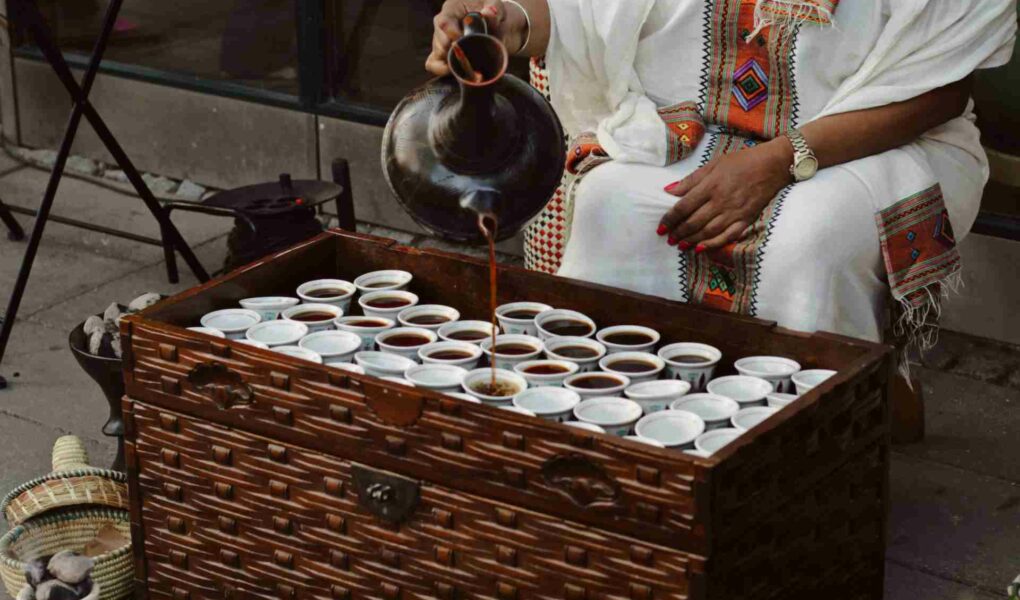Coffee is an integral part of Ethiopian culture, with a rich history that dates back centuries. One of the most significant traditions involving coffee in Ethiopia is the coffee ceremony, which is a unique and essential aspect of their culture. Cited as the origin country of coffee, we are going to delve into everything you need to know about the Ethiopian coffee ceremony, including its significance, steps, and how to make it.
What is the Ethiopian Coffee Ceremony
The Ethiopian coffee ceremony is a ritualized process of preparing and serving coffee in Ethiopia. It is a social occasion where people gather, converse, and bond over coffee. The ceremony is often held in a traditional setting, either in a home or a coffee house, and is performed by a host, usually a woman.
The ceremony involves a series of steps, including washing and roasting the coffee beans, grinding them, and brewing the coffee using a traditional pot called a jebena. The jebena is a clay pot with a long spout that is used for brewing and serving the coffee. The host of the ceremony also burns frankincense, which is believed to have spiritual and cleansing properties.
Importance of Coffee in Ethiopian Culture
Coffee has been a vital aspect of Ethiopian culture for centuries, with the country being one of the first to discover and cultivate coffee. The coffee plant is native to Ethiopia, and its beans are believed to have originated in the region of Kaffa. Coffee is an essential part of Ethiopian social life, and the coffee ceremony is a symbol of hospitality and respect.
In Ethiopia, coffee is often served during important occasions and social gatherings, such as weddings, funerals, and religious ceremonies. The ceremony is an opportunity for people to come together and share their stories, discuss their problems, and build relationships. Coffee is a unifying force in Ethiopian culture, bringing people together and creating a sense of community.
Not to mention the fact that Ethiopia is amongst the top coffee exporters in the world, making it vital to the locals and the economy.
History and Significance of the Ethiopian Coffee Ceremony
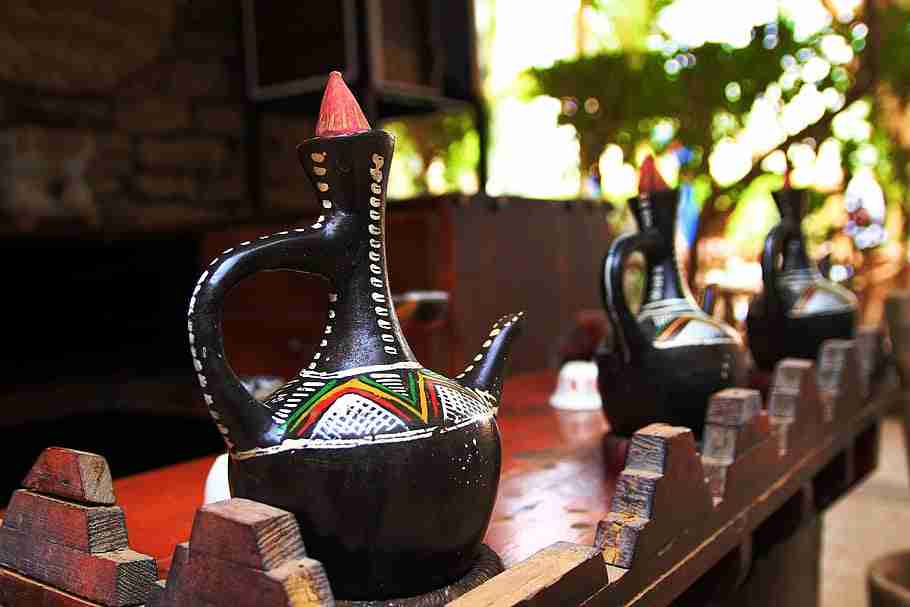
The Origin of Coffee
Coffee has been grown and consumed in Ethiopia for centuries, with some historians suggesting that the plant originated in the region. The first written references to coffee in Ethiopia date back to the 10th century, with accounts of local tribes using coffee cherries to produce a drink with invigorating effects. The popularity of coffee spread throughout the region, with the first coffeehouses opening in the 16th century. Today, Ethiopia remains one of the world’s leading producers of high-quality coffee beans.
Cultural Significance
Coffee is a vital part of Ethiopian culture, with the drink serving as a symbol of hospitality, friendship, and community. In Ethiopia, the coffee ceremony is a time-honored tradition that brings people together to share stories, discuss important issues, and connect with one another. The ceremony is also a way for Ethiopians to showcase their hospitality and generosity to guests.
Ethiopian Social and Cultural Traditions
The Ethiopian coffee ceremony is an elaborate and ritualized affair that takes place in homes, coffee shops, and public places throughout the country. The ceremony involves roasting green coffee beans over an open flame, grinding them by hand, and brewing them in a clay pot called a jebena. The coffee is then served in small cups, with the host pouring the coffee from a height to create a frothy, aromatic brew.
The ceremony is typically performed by women, who take great pride in their coffee-making skills and use the occasion to bond with other women in the community. The coffee ceremony is also a way to showcase Ethiopian hospitality, with guests being served multiple rounds of coffee, each with its unique flavor and aroma.
In addition to its social significance, the coffee ceremony has played a significant role in the political and economic development of Ethiopia. Coffee has long been a major export for the country, with the industry providing jobs and income for thousands of people. The Ethiopian government has also used coffee as a tool for promoting tourism and cultural heritage, with many tourists visiting the country specifically to witness the coffee ceremony firsthand.
Steps of an Ethiopian Coffee Ceremony
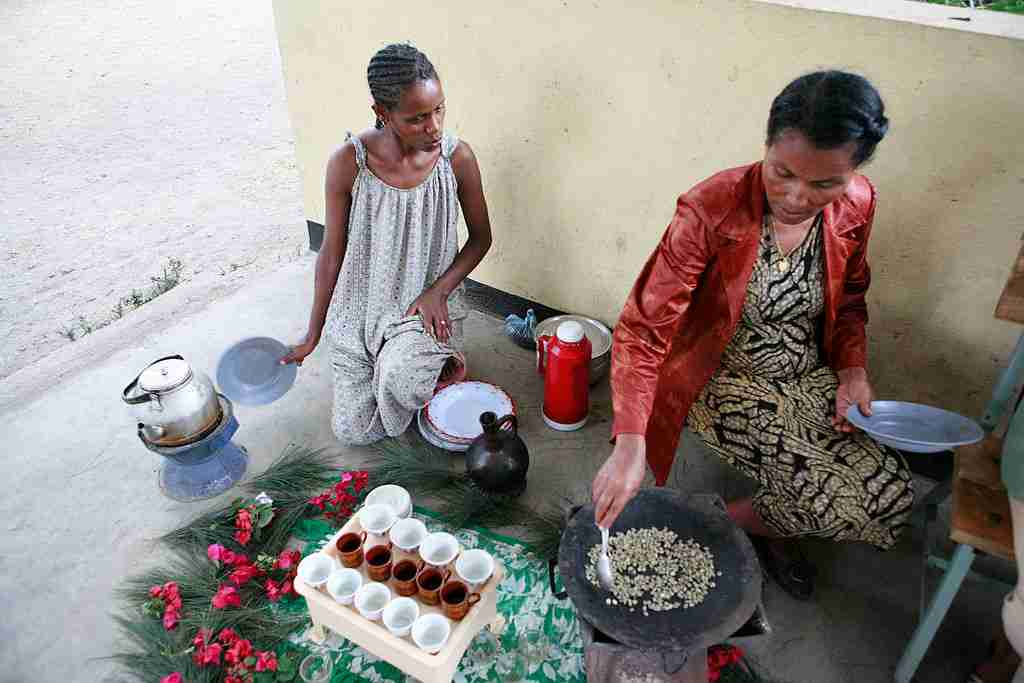
The Ethiopian Coffee Ceremony is a highly ritualized process, and every step is crucial to the overall experience. Here are the typical steps involved in the ceremony:
- Gathering the materials
The first step in the Ethiopian coffee ceremony is gathering the necessary materials, including coffee beans, a roasting pan, a mortar and pestle for grinding, a jebena (Ethiopian coffee pot), and small cups for serving.
- Roasting the coffee beans
The coffee beans are then roasted over an open flame in a special pan, known as a baret metad. This process is usually done by the woman of the household, who carefully watches the beans and stirs them continuously to ensure an even roast. The roasting process typically takes around 15 minutes, and the beans are removed from the heat once they reach a rich, dark brown color.
- Grinding the coffee beans
After the beans have been roasted, they are ground using a mortar and pestle. This is a time-consuming process, as the beans must be ground to a fine powder to ensure the best flavor. The ground coffee is then set aside until it’s ready to be brewed.
- Brewing the coffee
Next, the coffee is brewed using a traditional jebena, a clay pot with a long neck and a wide base. The jebena is filled with water and placed on a bed of coals, where it’s heated until the water comes to a boil. Once the water has boiled, the ground coffee is added to the pot, and the jebena is covered with a cloth to allow the coffee to steep.
- Serving the coffee
Once the coffee has steeped for several minutes, it’s poured into small, handle-less cups called sini. The coffee is typically poured from a height of several inches, which creates a frothy layer on top of the coffee known as the crema.
- Drinking the coffee
The coffee is served alongside traditional snacks such as popcorn, peanuts, and bread, and it’s often enjoyed in the company of friends and family. The coffee is sipped slowly, and it’s customary to drink three cups of coffee during the ceremony, each with a different level of strength and sweetness. Ethiopian coffee is renowned for its delicious taste.
Ethiopian Coffee Ceremony Etiquette
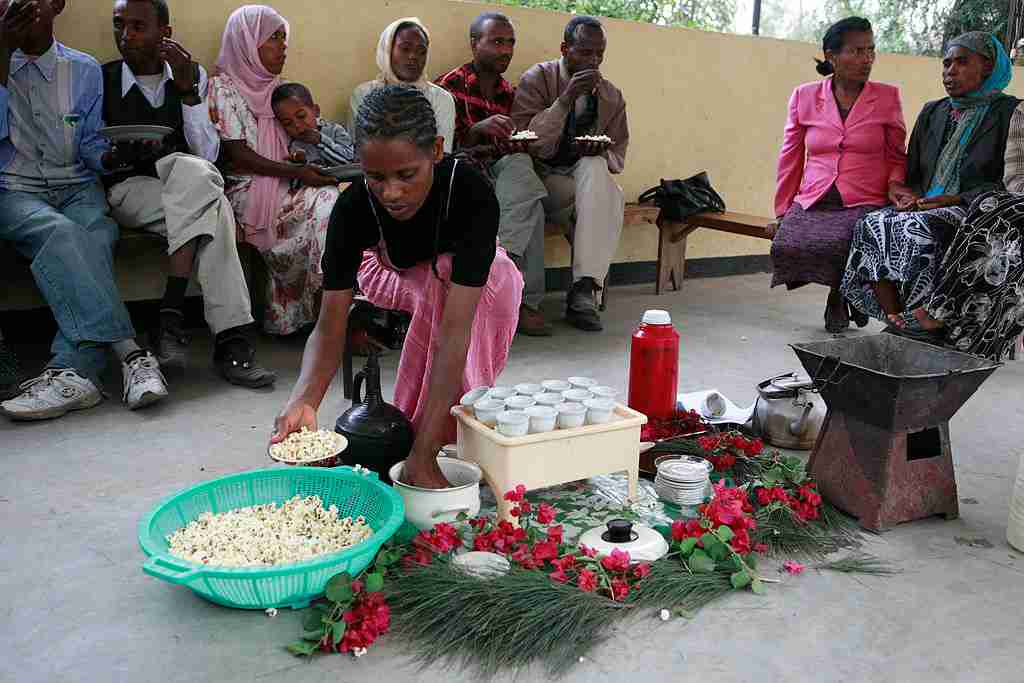
In Ethiopian culture, the coffee ceremony is a significant social occasion that follows a specific set of customs and traditions. Understanding and respecting these customs is crucial to fully appreciate the experience of the ceremony.
Cultural norms and expectations during the ceremony
- Dress Code: Guests are expected to dress modestly and conservatively. Wearing traditional Ethiopian clothing is also encouraged.
- Seating Arrangement: Guests are usually seated on a mat or a carpet around a low table. The seating arrangement is based on age and status, with elders given the highest respect.
- Conversation: During the ceremony, guests engage in conversation and storytelling. It is considered impolite to interrupt the host or other guests.
- Hand-Washing: Before the coffee is served, guests are offered a bowl of water and a towel to wash their hands. This symbolizes the start of the ceremony.
- Coffee Drinking: When drinking coffee, it is customary to take three cups. The first cup is called “Abol,” the second “Tona,” and the third “Baraka.” Each cup has a specific meaning and significance.
How to behave as a guest during the ceremony
- Show Respect: Guests should show respect to the host and other guests by observing the customs and traditions of the ceremony.
- Bring a Gift: It is customary to bring a small gift for the host as a gesture of appreciation for their hospitality. A bouquet of flowers or a small food item is appropriate.
- Wait to be Served: Guests should wait to be served and should not begin drinking the coffee until the host has served them.
- Use the Right Hand: It is customary to use the right hand to drink coffee, eat food, and exchange items during the ceremony. The left hand is considered unclean.
- Express Gratitude: After the ceremony, it is customary to express gratitude to the host for their hospitality and to thank them for the experience.
How to Make Ethiopian Coffee at Home
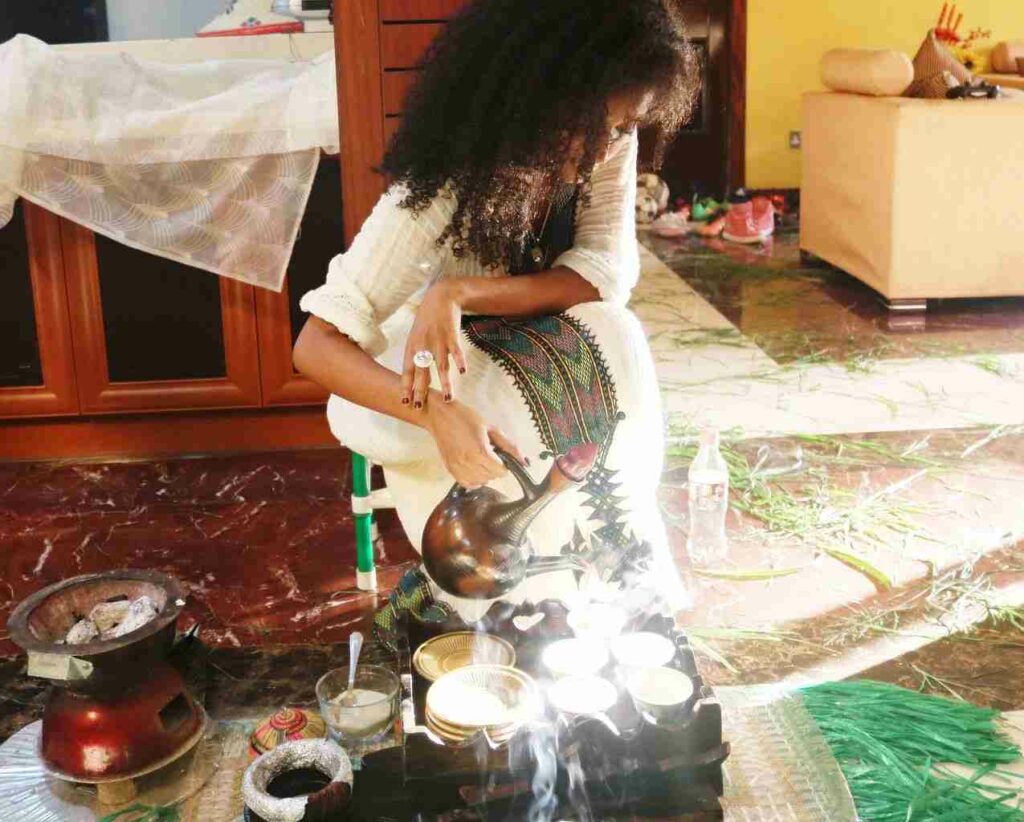
If you’re interested in trying to replicate the Ethiopian coffee ceremony at home, here’s what you’ll need and how to do it:
Equipment needed
- Green coffee beans (preferably Ethiopian)
- A stovetop pan or popcorn maker for roasting
- A mortar and pestle or coffee grinder for grinding
- A jebena (traditional Ethiopian coffee pot)
- A heat source (such as a stove or hot plate)
- Optional: a coffee filter or cheesecloth
Instructions for roasting and grinding the beans
- Preheat your pan or popcorn maker over medium heat.
- Add your green coffee beans to the pan or popcorn maker.
- Stir or shake the pan constantly to prevent burning and ensure even roasting.
- Remove from heat when the beans are a dark brown color and have a noticeable aroma.
- Transfer the roasted beans to a mortar and pestle or coffee grinder and grind until it reaches a fine or coarse consistency, depending on your preference.
Brewing methods and tips
- Fill your jebena with water and bring to a boil.
- Add the freshly ground coffee to the jebena.
- Reduce the heat to a low simmer and allow the coffee to brew for several minutes.
- Remove the jebena from the heat source and allow the coffee grounds to settle at the bottom.
- Pour the coffee into small cups from a height, allowing it to foam up and cool slightly.
- Serve and enjoy with traditional Ethiopian snacks, such as popcorn or bread.
Note: If you don’t have a jebena, you can use a regular coffee pot or French press as an alternative. Additionally, you can use a coffee filter or cheesecloth to strain out the grounds before serving.
Frequently Asked Questions
What is the Ethiopian coffee ceremony called?
The Ethiopian coffee ceremony is known as “Buna” in Amharic, which is the official language of Ethiopia.
What are some traditional foods served during the ceremony?
Traditional foods served during the ceremony include roasted barley or peanuts, popcorn, and sometimes bread or pastries.
How long does the ceremony typically last?
The length of the ceremony can vary depending on the occasion, but it typically lasts around 1-2 hours.
What is the meaning behind the coffee ceremony ritual?
The coffee ceremony is a symbol of hospitality and respect in Ethiopian culture. It is a way for people to come together and bond over the process of making and drinking coffee.
The Final Sip
The Ethiopian coffee ceremony is an important part of Ethiopian culture and history, and serves as a symbol of hospitality, respect, and community. B. If you ever have the opportunity to experience the Ethiopian coffee ceremony, it is definitely worth it to gain a deeper understanding and appreciation for Ethiopian culture and traditions.

